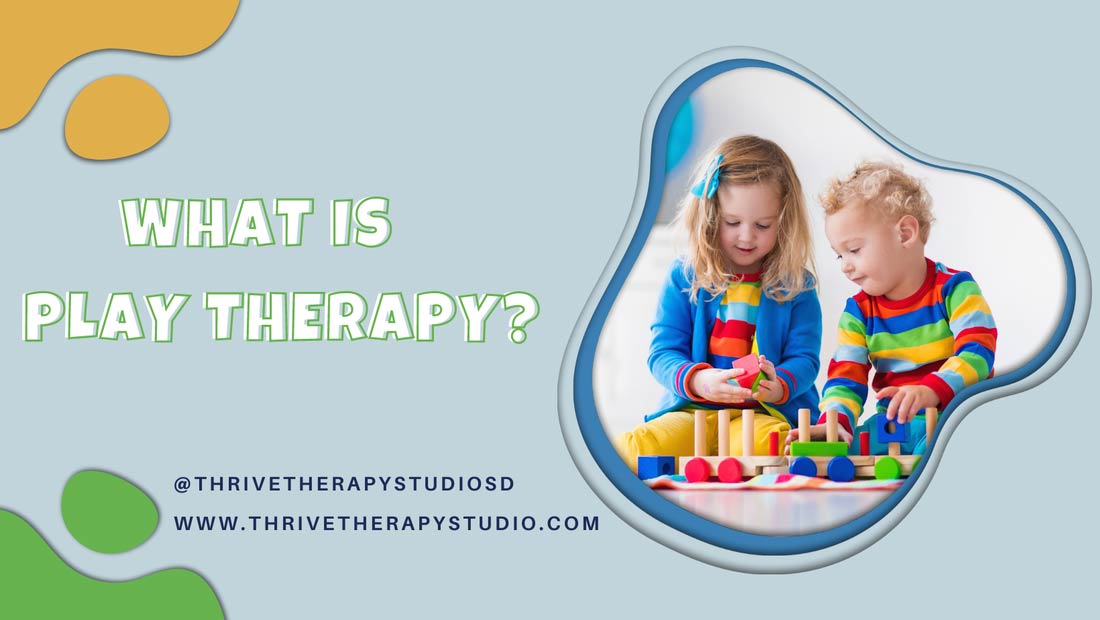As a therapist who works with children, I have often been asked by parents what play therapy is, what its purpose of it is, and how it works. So, I hope to convey a bit about what play therapy actually looks like and the reasons why we use it!
“Toys are children’s words and play is their language”. This is a commonly shared quote by Garry Landreth, a prominent play therapist. Play therapy is a form of therapy that is commonly used with children (but even adults can engage in play therapy too!). In typical therapy with adults, adults can verbalize their experiences, emotions, and needs. Children of course are often unable to do so, especially very young children. As many children are unable to put into words their experiences or communicate their needs or pain, play therapy is a way that they can do so that fits their developmental stage. No talking is required since play is a thorough method of communication!
Play therapy is different from normal play. As a therapist stays attuned to what is happening for the child in their play, it can help the child process their feelings and experiences. Rather than spending the session talking, we can work to help children resolve issues via play.
There are so many different tools, toys, and play activities children can use in play therapy. Sometimes this can be playing with dolls or figurines, using a sand tray, making art, or other types of pretend play. The toys can resemble different themes or aspects of their lives, such as family relationships, safety, power, or interpersonal relationships. Play is a safe space where children can play out scary scenarios or painful experiences or emotions. Sometimes these experiences or issues would be too scary or overwhelming to face outside the therapy room. Through this play, they can process the events and practice resolving issues within the safe space, while also providing a sense of relief. It provides children a developmentally appropriate way to deal with depression, anxiety, and even trauma.
Often, play therapy can be directive to help reach specific goals, while often it is very non-directive. When play is non-directive, it gives the child a chance to lead, develop confidence, and increase their sense of agency. Play gets to be organic. It is a chance for them to explore what they would like to in therapy. Many times when I have done play therapy, I will let the child know at the beginning of therapy “this is your play place. You can do anything you would like to. If there is something you can’t do, I will let you know”. After setting boundaries around safety, the children get to just take it from there! Play also helps children let their guard down and just be themselves.
Play therapy does four major tasks.
- Facilitates communication. Play promotes self-expression and communicating thoughts and feelings. It allows children to overcome difficulties without needing to have the ability to verbalize them. Metaphors are also used in play to help them solve their problems.
- Fosters emotional wellness. Play helps children release unpleasant feelings, increase their sense of control, and improve their overall mood.
- Increases personal strengths. Children can practice their problem solving skills, build self-esteem, and increase their creativity. This can increase their overall confidence to tackle issues in the world outside the therapy room.
- Enhances social relationships. Parents can be involved in play therapy, playing alongside their child. This play works to facilitate positive emotions and attachment between parents and children. Children get to practice their social skills and through role-playing, they can increase the empathy they have for others.
Play therapy is a great way for children to process and resolve the issues they are facing in a safe and developmentally appropriate way. It is a unique take on therapy, reminding us that children have found their own way of communicating without the need for words.
Reach out to start
your healing journey


